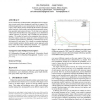Free Online Productivity Tools
i2Speak
i2Symbol
i2OCR
iTex2Img
iWeb2Print
iWeb2Shot
i2Type
iPdf2Split
iPdf2Merge
i2Bopomofo
i2Arabic
i2Style
i2Image
i2PDF
iLatex2Rtf
Sci2ools
CIKM
2009
Springer
2009
Springer
A signal-to-noise approach to score normalization
Score normalization is indispensable in distributed retrieval and fusion or meta-search where merging of result-lists is required. Distributional approaches to score normalization with reference to relevance, such as binary mixture models like the normal-exponential, suffer from lack of universality and troublesome parameter estimation especially under sparse relevance. We develop a new approach which tackles both problems by using aggregate score distributions without reference to relevance, and is suitable for uncooperative engines. The method is based on the assumption that scores produced by engines consist of a signal and a noise component which can both be approximated by submitting well-defined sets of artificial queries to each engine. We evaluate in a standard distributed retrieval testbed and show that the signal-to-noise approach yields better results than other distributional methods. As a significant by-product, we investigate query-length distributions. Categories and...
| Added | 26 May 2010 |
| Updated | 26 May 2010 |
| Type | Conference |
| Year | 2009 |
| Where | CIKM |
| Authors | Avi T. Arampatzis, Jaap Kamps |
Comments (0)

